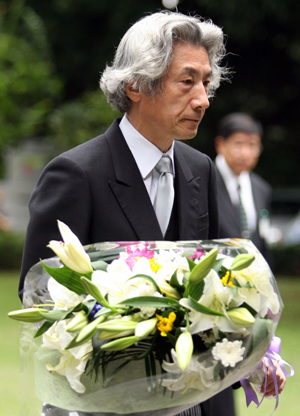Japanese Prime Minister
Junichiro Koizumi's latest visit to the Yasukuni Shrine has seriously affected
the improvement of China-Japan relations and hurt the international image and
national interest of Japan.

Japanese Prime
Minister Junichiro Koizumi pays tribute at Chidorigafuchi national
cemetery, Japan's nondenominational tomb of the unknown soldier, in Tokyo
August 15, 2006. Koizumi visited the nearby Yasukuni shrine, dedicated to
Japan's war dead, early on Tuesday, the anniversary of Tokyo's World War
Two surrender. [Reuters] |
Chinese State Councilor
Tang Jiaxuan made the remarks in Beijing Sunday when meeting with Doi Takako,
honorary leader of the Social Democratic Party of Japan.
Koizumi visited the Yasukuni Shrine on August 15, anniversary of Japan's
surrender in World War II.
Tang said the deadlock of Sino-Japanese political relations lies in that the
Japanese leaders insist on visiting the Shrine which honors Japanese "class A"
war criminals.
Koizumi's visit severely harms the feeling of the people victimized by
Japanese militarist aggression and damages the political basis of Sino-Japanese
relations, he said.
Koizumi visited the shrine every year since he took office as prime minister
in 2001.
Tang said the Chinese side will continue to work for breaking the deadlock of
Sino-Japanese relations.
He said he hopes that the Japanese side can follow historical trends and the
wills of the peoples of the two countries, remove political barriers and push
Sino-Japanese relations, together with China, back onto a normal development
track.
Tang said he highly appreciates Doi for her long-term work on improving
Sino-Japanese friendship and hopes that she can make more efforts in this
aspect.
Doi was former leader of the Social Democratic Party of Japan and also former
speaker of the House of Representatives from 1993 to 1996. She visited China
many times and former Chinese President Jiang Zemin and President Hu Jintao had
met with her.
Doi said to abide by the three political documents between the two countries
is the foundation of maintaining a healthy and stable bilateral relationship.
Correctly understanding history is important both to Japanese-Chinese
relationship and Japan's development, she said.
Relations between the two countries have been chilled by Koizumi's visits.
Soon after Koizumi's sixth visit on August 15, Chinese Foreign Ministry
issued a statement expressing "strong protests" against the move.
Foreign Minister Li Zhaoxing summoned Japanese Ambassador to China Miyamoto
Yuji and lodged strong objections.
In Beijing more than 30 Chinese citizens gathered outside the Japanese
embassy on the morning of Aug. 15 to protest against Koizumi's visit.
The anger over Koizumi's shrine visit also spread in Nanjing, capital of
eastern China's Jiangsu Province, where at least 300,000 Chinese were massacred
by Japanese troops in 1937.
In Japan, Koizumi's shrine visit also prompted protests from opposition and
coalition parties, politicians and civil groups, according to media
reports.